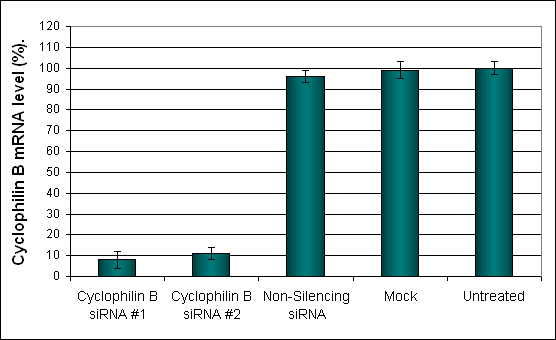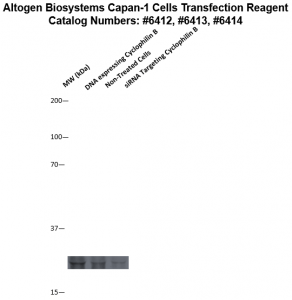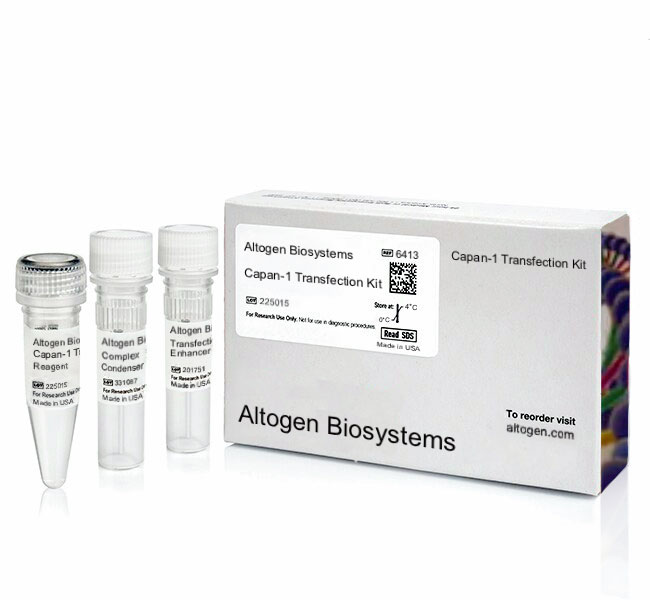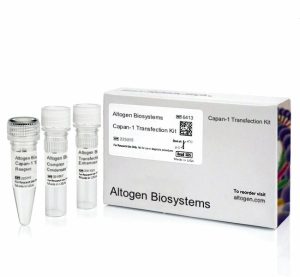Description
Purchase Orders: Click “Add to Cart” button to order, then email PO to orders@altogen.com.
Product Availability: In Stock.
Transfection Reagent for Capan-1 Cells (Pancreatic Carcinoma Cells, HTB-79)
-
Proprietary cationic lipids formulation
-
High transfection efficiency of small RNA (siRNA, shRNA, miRNA), mRNA, pDNA
-
Effective and robust transfection
-
Kit includes Complex Condenser and Transfection Enhancer reagents
-
Produces consistent results, lot-to-lot, plate-to-plate, and well-to-well
-
A proven reagent for establishing stable cell lines
-
Optimized transfection protocols are adapted for use with both standard & reverse transfection methods
-
Download in vitro Capan1 transfection protocol: [PDF]
- Download Capan-1 CRISPR/Cas9 transfection protocol: [PDF]
-
Download PowerPoint presentation for Capan-1 cells transfection kit: [PPT]
- UPC/GTIN/EAN: 860002089747
-
Brand: ALTOGEN®, developed and manufactured by Altogen Biosystems
Transfection Efficiency:
Reagent exhibits at least 89% transfection efficiency of siRNA delivery. Transfection efficiency was determined by qRT-PCR.
Product Description:
Transfection reagent is specially designed for the Capan-1 human pancreatic cancer cell line. Transfection reagent supplemented by complex condenser and transfection enhancer ensures high efficiency in delivering cargo biomolecules into these cells.
Transfection Protocol and SDS:
Download Altogen Biosystems Transfection Protocol: [PDF]
Download SDS: [PDF]
Capan-1 Cell Line:
Pancreatic cancer remains one of the deadliest tumors with a poor prognosis and life expectancy. According to the National Pancreatic Cancer Foundation (NPCF), only 5% of pancreatic cancer patients will be still alive five years after the diagnosis. The Capan-1 cell line was derived from a 40-year-old male patient of pancreatic cancer. These tumorigenic cells exhibit an epithelial cell morphology and make suitable transfection hosts. Capan-1 cells have been known to produce gastric-type mucin, and express CFTR (cystic fibrosis transmembrane conductance regulator). The Capan-1 pancreatic cell line has proven to be a reliable host for transfection studies that aid investigative research for new drugs. In addition to being a suitable host for pancreatic cancer studies, this cell line is helpful in molecular biology as well as in drug discovery research. Altogen Biosystems offers advanced cationic lipid formulation high-efficiency transfection reagent kits for the Capan-1 pancreatic cancer cell line.
The Capan1 cell line is a human pancreatic adenocarcinoma cell line that was derived from a patient with pancreatic cancer. These cells are commonly used in research to study the pathophysiology of pancreatic cancer and to test potential therapies for the disease. Capan-1 cells have been shown to retain many of the characteristics of pancreatic adenocarcinoma cells, including the ability to form tumors in immunodeficient mice and to secrete pancreatic enzymes such as amylase and lipase. Researchers use Capan1 cells to investigate the molecular pathways that drive the development and progression of pancreatic cancer, as well as to test the efficacy of potential drugs that may be used to treat the disease.
Mutations:
| KRAS | 3845 | 37 | 12 | 25398284 | 25398284 | Missense_Mutation | SNP | C | A |
| TP53 | 7157 | 37 | 17 | 7578454 | 7578454 | Missense_Mutation | SNP | G | A |
| CCDC116 | 164592 | 37 | 22 | 21990876 | 21990876 | Silent | SNP | C | T |
| STEAP1B | 256227 | 37 | 7 | 22532267 | 22532267 | Silent | SNP | G | A |
| SERPINA10 | 51156 | 37 | 14 | 94756286 | 94756286 | Silent | SNP | C | T |
| PDE1A | 5136 | 37 | 2 | 183053786 | 183053786 | Splice_Site | SNP | C | T |
| NDN | 4692 | 37 | 15 | 23932258 | 23932258 | Missense_Mutation | SNP | G | A |
| CEACAM8 | 1088 | 37 | 19 | 43097693 | 43097693 | Splice_Site | SNP | G | T |
| KCNA6 | 3742 | 37 | 12 | 4919805 | 4919805 | Missense_Mutation | SNP | C | T |
Data:

Figure 1. Cyclophilin B silencing efficiency was determined by qRT-PCR in the Capan-1 cells transfected by Cyclophilin B siRNA or non-silencing siRNA control following the recommended transfection protocol. Cyclophilin mRNA expression levels were measured 48 hours post-transfection. 18S rRNA levels were used to normalize the Cyclophilin B data. Values are normalized to untreated sample. Data are presented as means ± SD (n=6).

Figure 2. Protein expression of Cyclophilin B in Capan-1 cells. DNA plasmid expressing Cyclophilin B or siRNA targeting Cyclophilin B were transfected into Capan-1 cells following Altogen Biosystems transfection protocol. At 72 hours post-transfection the cells were analyzed by Western Blot for protein expression levels (normalized by total protein, 10 µg of total protein loaded per each well). Untreated cells used as a negative control.
Selected in vivo transfection product citations (ALTOGEN® IN VIVO Transfection Kits used in the following publications):
- Cancer Research. 2011 71(15):5144-53. Inhibition of miR-193a expression by… Iliopoulos et al [PDF]
- Hypertension. 2012 59(1):158-66. Role of uncoupled endothelial nitric oxide synthase … Gao et al [PDF]
- Jounal of Biological Chemistry. 2012 287(4):2907. Chaperoning of mutant p53 protein … Gogna et al [PDF]
- PLoS Pathogens. 2012 8(8) Uridine composition of the poly-U/UC tract of HCV RNA … Schnell et al [PDF]
- Mol Cell Biol. 2013 33(7). SCO2 induces p53-mediated apoptosis by Thr845 phosphorylation … Madan et al [PDF]
- Hypertension. 2015 65(2):430-9. Neurokinin 3 receptor and phosphocholine transferase… Parchim et al [PDF]
Altogen Biosystems manufacturers preoptimized transfection kits for cancer research. Reagents and transfection protocols are optimized for individual cancer cell lines. Altogen Biosystems developed two types of in vivo delivery kits for animal research: Tissue-targeted reagents (delivery into liver, pancreas, and kidney tissues), and in vivo biodistribution reagents (PEG-Liposome, Nanoparticle, Lipid, and Polymer-based kits). Optimized transfection protocols provide efficient intracellular delivery of proteins, DNA, and RNA molecules. Read more about transfection technology at Altogen’s Transfection Resource. Altogen Labs provides GLP compliant contract research studies for preclinical research, IND applications, and drug development. Biology CRO services include: Xenograft models, development of stable cell lines, ELISA assay development, cell-based and tissue targeted RNAi studies, safety pharm/tox assays, and other studies (please visit AltogenLabs.com).
Volume Options:
- 0.5 ml (Catalog #6412)
- 1.5 ml (Catalog #6413)
- 1.5 ml CRISPR (Catalog #2126)
- 8.0 ml (Catalog #6414)
Purchase Orders: Click “Add to Cart” button to order, then email PO to orders@altogen.com.
Product Availability: In Stock.






